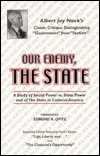Our Enemy, the State

Unveiling the Thought-Provoking Pages of "Our Enemy, the State" by Albert Jay Nock
A Journey into Political Philosophy
Albert Jay Nock's Provocative Perspective
"Our Enemy, the State" by Albert Jay Nock is not your typical political treatise. It's a thought-provoking exploration of the role of the state in society, challenging conventional wisdom and encouraging readers to scrutinize the relationship between individual liberty and government authority.
Personal Prelude: A Literary Quest
My encounter with Nock's work began during a period of curiosity about political philosophy. "Our Enemy, the State" came highly recommended, and I dove into its pages with the hope of gaining a deeper understanding of the complex interplay between the individual and the state.
The State as the Antagonist
Nock's Bold Assertion
Nock's central thesis boldly positions the state as the antagonist, questioning the prevailing belief in the benevolence of government. The author challenges readers to reevaluate their perceptions and consider whether the state is genuinely a guardian of individual freedoms.
Personal Anecdote: Rethinking Assumptions
Reading Nock's contrarian perspective was akin to having the ground shift beneath my feet. The assumptions I held about the inherent goodness of the state were called into question. It prompted a reevaluation of my beliefs, encouraging me to question the role of authority in our lives.
The Nature of Government
Government vs. the State
Nock draws a crucial distinction between government and the state, emphasizing that not all governance is inherently harmful. While government may be necessary for order, the state, as Nock sees it, often exceeds its boundaries, encroaching on individual liberties.
Personal Insight: Navigating Governance
As I pondered this distinction, I found myself reflecting on instances where governance was a force for good, maintaining order and ensuring justice. Nock's nuanced approach allowed me to appreciate the shades of gray in the complex relationship between individuals and authority.
The Elite and the Masses
The Power Elite's Influence
Nock delves into the concept of the "Remnant," a term he uses to describe the enlightened few who resist the state's encroachments. He warns against the influence of a power elite that seeks to control the masses, manipulating public opinion for its own gain.
Personal Reflection: The Role of the Enlightened
The idea of the Remnant struck a chord, prompting me to consider the role of the enlightened few in society. Nock's words fueled a sense of responsibility, encouraging me to seek knowledge and contribute to the betterment of society.
A Call for Individual Responsibility
The Responsibility of the Individual
While critiquing the state, Nock places significant emphasis on individual responsibility. He challenges readers to cultivate a sense of personal responsibility and self-improvement, advocating for a society where individuals take charge of their own destinies.
Personal Growth: A Call to Action
Nock's call for individual responsibility acted as a catalyst for personal growth. It spurred a commitment to continuous learning and a sense of empowerment to contribute positively to my community. The book became a guide in navigating the balance between personal autonomy and societal well-being.
Conclusion: Nock's Enduring Challenge
Albert Jay Nock's "Our Enemy, the State" is not a book that leaves you indifferent. It challenges your assumptions, prompts reflection, and ignites a sense of responsibility. Whether you agree or disagree with Nock's perspective, the book stands as an enduring challenge to critically examine the role of the state in our lives.